On November 3, 2016, her Excellency, Daw Aung San Suu Kyi (ASSK) visited the Center for Southeast Asian Studies (CSEAS) and was awarded an honorary degree of Doctor for her contribution to the advancement of democracy in Myanmar and the world as a whole.
ASSK, a previous fellow at CSEAS, resisted the Burmese military government through non-violent means and led the National League for Democracy (NLD) while under house arrest for over 15 years. During the historic elections of 2015, the NLD was supported by a great majority of Burmese and the country made a peaceful transfer of power and is currently working toward a more civilian-based political system.
Between 1985-86, she was engaged in research at CSEAS, focusing on her father, General Aung San. In 2013, ASSK visited Kyoto University and was awarded the title of Honorary Fellow of Kyoto University. To date, Kyoto University has conferred thirteen Honorary Doctoral degrees to outstanding scholars for their scientific contributions in various fields. This is the first time that the university has conferred such an honorary degree on an individual for their commitment to freedom, democracy, and human rights.
This article is a synopsis of ASSK’s conferral speech and her discussion with Kyoto University Students.
ASSK: I would like to say it is indeed a great pleasure to be back here in the city of Kyoto and this University of Kyoto. When I came to Japan for the first time 30-years ago, it was almost to the day because I came in October 1985. My young son and I were welcomed by this city and by this University. It was wonderful how quickly we felt we were part of the life here. And it is amazing that even now after 30 years when I was in Tokyo I found out I had forgotten all my Japanese. But when I came to Kyoto, there is magic about this place: its beauty, its history, its culture, and with regard to the university its academic excellence, and its international reputation. Its international reputation is based to a large extent on its capacity to engage with and to absorb the many scholars from all across the world who visited this university. I know what a rare prize it is to be awarded an honorary doctorate from this University, especially since this is the first that somebody with no real achievements in science has been awarded such a degree. But of course the science of politics, which is really the science of people trying to live together in a civilized society, is fundamental for the promotion of other scholarly works. Without peace and without freedom we will not be able to achieve academic excellence. We need peace, we need freedom. We also need the affluence that will enable us to do the kind of research that will push the world forward, and that will elevate the status of human society. When I was told that I was going to be awarded an honorary doctorate, I wondered whether it was going to be in Law. But this is an unusual doctorate because it is for what I have done for the advancement of democracy in my own country, and as president Yamagiwa Juichi has kindly said, in the world at large. Advancement is the correct word because we have not yet reached our goal. In a sense, with democracy we can say that we will never reach our goal. Our goal has to be beyond reach because we have to keep working towards it. Once we stop working for democracy, it will fade away. It is like an unused muscle. We have to keep it exercised all the time. I keep reminding our people how important it is for us, not just to claim our democratic privileges, but also to discharge democratic duties, that we may be able to make our society a vibrant one: politically, socially, and culturally.
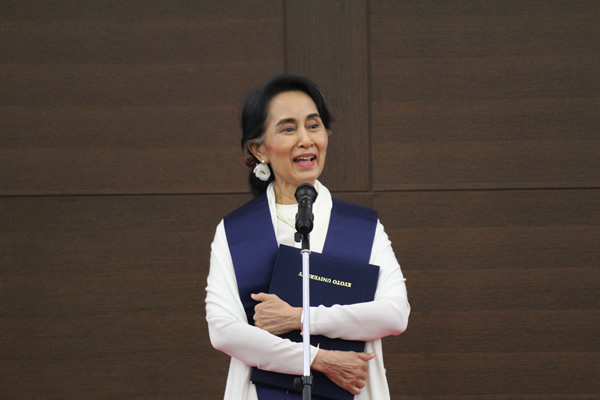
Fig.1 記念スピーチ.
Kyoto is a great center of culture and before we came into this room the chairman, Dr. Inaba Kayo and I, were discussing the importance of culture and cultural exchanges. Culture is something we can keep alive only if people believe in it. You can’t force people to preserve a culture. You can force them only externally, you can lay down rules and regulations, you can promulgate laws that force people to keep to a certain type of culture. But it will be just a dead visage, it will not be alive, it will be not real or genuine. So to keep culture really alive we have to keep the human spirit alive, which is why I say that the science of politics is the most important science, the science of people living together in peace and in harmony, that the human race might progress. It is not for me to lecture academics because I myself am not an academic. And it is a very dangerous thing to try to do. So I am simply putting to them my views on how we think that academia can cooperate and work together with not just students that come to the university but with people in general, with different countries, with different systems, with different cultures, to make sure our world is moving in the right direction. Well the world is round because it is going ’round and ’round and we never really know where we are going sometimes. And this is a mystery and a challenge. We hope that we are going in the right direction. We can never be sure. Of course, I think that the positive aspects of human nature outweigh the negative because if this were not so I think we would still be running around in caves. I am not sure, but I think so. And it is the opposite. The positive aspects of our nature have brought us forward to this point where people from all over the world can meet together. I think predominantly in this room there are Japanese and people from Burma. But I believe that perhaps there are a few from other countries as well. And for people from different parts of the world to come together, to be able to communicate with one another, that in itself is a truly amazing achievement. When we think that just a hundred years back this would have been almost an impossibility for people of all ages, from different aspects of life, from different countries to meet in one room and not think this is extraordinary at all. This is the achievement of our world and democracy, also the achievement of the human race. The belief that people can gather together and come to a wise, common decision. That is indeed an act of faith. And it is based on this faith that we have struggled for democracy in Burma and for peace, because there can’t be peace without democracy and there can’t be democracy without peace. We have just started out on the road to stabilizing our democratic roots, and to achieving peace which has long eluded us for our country. We hope that the time is not far when we can say, we have achieved peace for our country and we have strengthened the democratic roots of our society so that coming generations may be secure in the knowledge that their country will be shaped as they wish it to be. And for this we would like to thank our friends from all over the world who have helped us in various ways and among those friends who have helped us is Kyoto University. When I came here in 1985, the movement for democracy had not yet started. Yet Kyoto University was kind enough to welcome me and to treat me with no less consideration than I am treated today. In fact, I think I was treated more warmly and more as a human being 30 years ago than I am now as a representative of a government. I don’t know why people want to be representatives of governments because I think it is much better to be just yourself. I have always found that people are much warmer towards you and the way in which the people of Kyoto took me to their hearts 30 years ago, that could not be bettered in any way. So, I would like to conclude by saying thank you to the university and thank you to the people of Kyoto.
Dialogue with Kyoto University Undergraduate Students
My name is Kazuma Komatsubara and I major in economics in Kyoto University. And I also belong to the American Football Club. It is a great honor to be here today and meet you. Today I want to ask you about motivation. The American Football Club is aiming to win the national championship but many people, even the students of Kyoto University, believe that it is not possible. In the same way I think the world thought that it was very difficult for you to fight for democracy when you were placed under house arrest for a total of 15 years. During those years, what kept you going and what motivated you when you were trying to accomplish something that many other people believed it was difficult to do? Thank you.
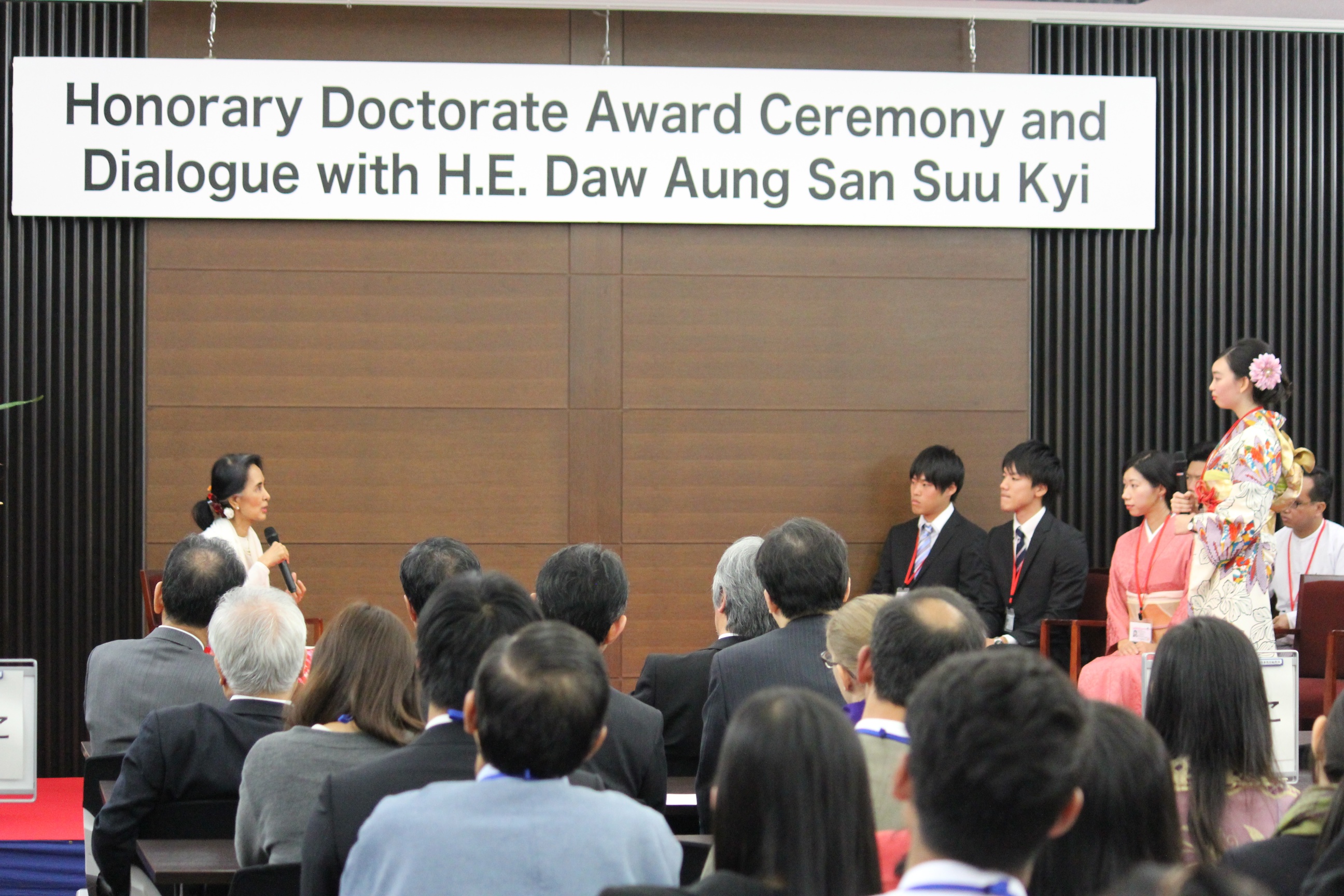
Fig.2 対話イベント
ASSK: Well, you use the word ‘impossible.’ People say that it will be impossible for you to win the championship. That reminds me of a motto that was on the wall, I believe, of an Royal Air Forces (RAF) station during the Second World War, where they said, “we do the impossible everyday but miracles take a little longer.” So you have to keep that in mind. Impossible is something that you should be able to achieve every day. Every day you should be able to achieve something different, something new, something that you have not achieved before. When we were struggling for democracy there were times when it was very difficult to. Our whole party was reduced to no more than a very small room in Yangon, which passes as headquarters. But we never thought that we would fail because we believed in what we were doing. And I think this it is the greatest motivation. You have to believe in what you are doing and you have to have the faith to keep going. It’s not enough hoping. I always say that hope is no use without endeavor. If you want something you’ve got to work for it. But you’ve got to believe in it. If you don’t believe in it you won’t really work hard for it. If the members of the team don’t believe that they will ever win the championship, you will not win it, because they won’t work hard enough to win it. They won’t have the faith that will motivate them. They won’t have the intrinsic belief that they are capable of doing it. We always believed that we would win through because we believed that our cause was just. I won’t use the word ‘right’ because ‘right’ can be interpreted in many ways. But we believed that it was just because what we were trying to achieve was for our whole society, for our whole country, not for our party. So because of our faith in what we were doing, we were able to win through. Mind you, we are not at the end of the road yet. That takes a long time.
My name is Soyako Harima, a fourth-year student in the faculty of Law. I have really enjoyed the past 4 years as a student, including a study abroad program in Uppsala University in Sweden and Oxford University. I am going to graduate from Kyoto University really soon and I have to think about my future, my very first career. So recently I am always asking myself questions about my life. What do I want to achieve in my life and what kind of person do I want to be? Meanwhile you have dedicated yourself to achieving democracy and peace in your country and people. I respect you as a role model. Who do you respect as your role model and what kind of philosophy or idea have you kept in your mind during your whole life?
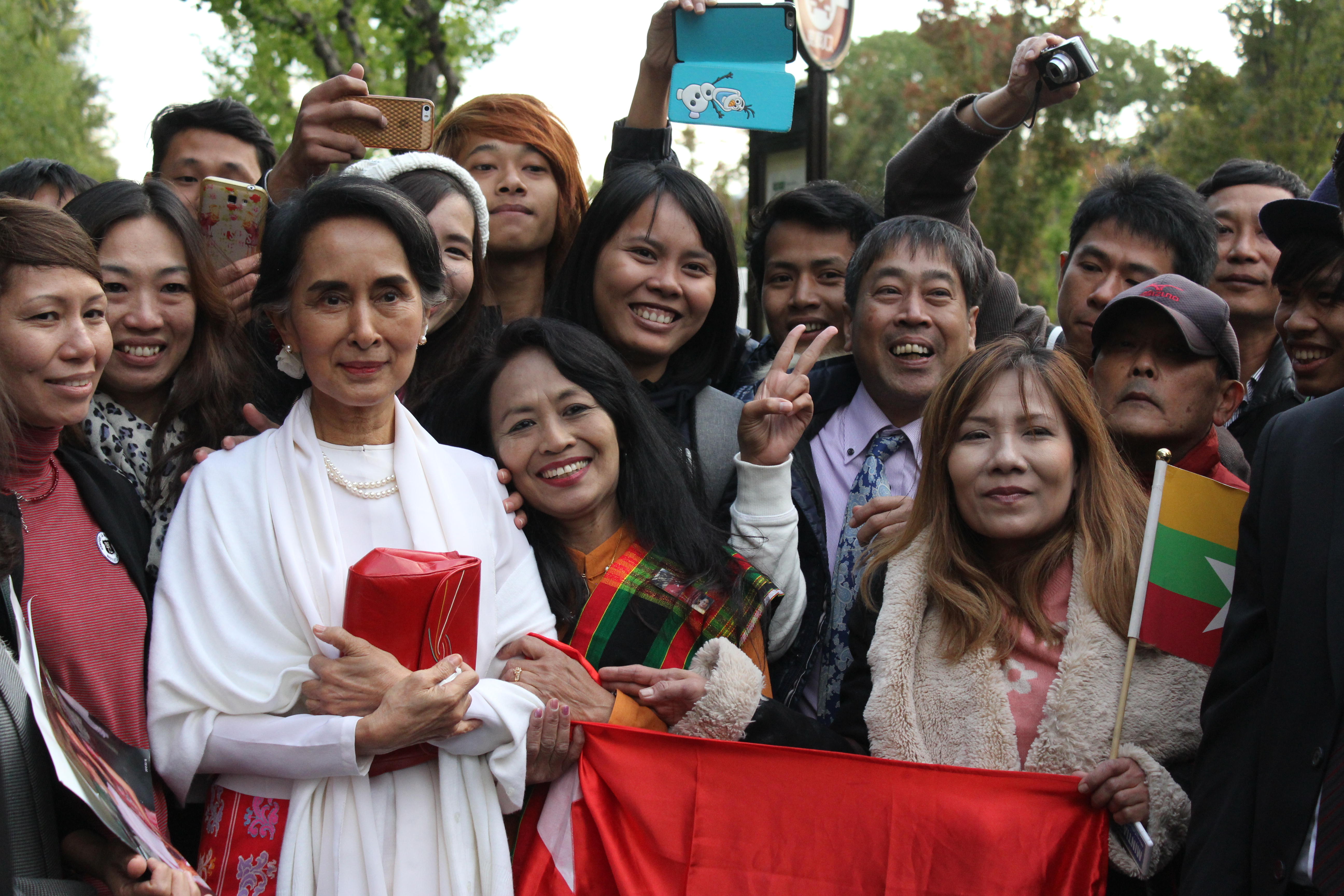
Fig.3 会場の外につめかけたミャンマー人支持者との記念撮影
ASSK: I have always found the expression ‘role model’ rather difficult to cope with. I am not exactly sure what it means. Does it mean somebody whom you wish to emulate, because I don’t think there is any one particular person that I wish to emulate. If that is what role model means. I have great admiration and respect for my father, not just as my father but as a leader of our country. But there are other people whom I respect as well. And we were talking about science earlier. For example, I have great respect for Marie Curie and I often think if I had read her biography earlier I might have gone into science. But, I read it too late to be able to change my subject. But I don’t think you should look to one particular person as a role model because nobody is perfect. We all have our weaknesses and our strengths. So what you have to do is to decide for yourself how best you can contribute to the well-being of the society in which you live. That doesn’t have to be in a large way. I often think that people who discharge their duties and their responsibilities fully, whatever these may be, are far more effective than those who may be in very important positions but who abuse their power and their influence in a way that is negative for society as a whole. I was trying to make our people understand what democracy is all about because we lost democracy back in 1962. That’s more than 50 years ago when you were not even thought of. That’s a long time ago. And many of our people had no understanding of what democracy was. When we made them try to understand and to become a part of the movement they would ask questions like, “But I’m nothing. I’m not educated. I’m just a street hawker. How can I help?” Then I would say if you are a street hawker and your work is simply to sell whatever it is you are able to hawk around from one place to another and if you do it honestly, if you do it honestly in the sense that you ask the right price, and whatever you are selling is what you say it is, then you are discharging your responsibility. And you can also be pleasant about it. You can try to make your surroundings a little better because of you and I think this is how you have to look at it. Everybody cannot be a celebrity. I think this is the age of celebrities and people think you have to be a celebrity in order to be someone. I don’t think that is the case. I’ve always said the most effective people in our movement are the unknown soldiers, those who worked for the movement without ever being recognized in any way. And they were happy to do that. So I think it is what you can contribute, what you think you can contribute, not what you think you can get back. That will give you the greatest satisfaction. So just find that out for yourself and don’t look for role models.
My name is Yuki Masuo and I am thrilled and honored to be here today to have the privilege to ask you a question. I am a 5th year student at the faculty of medicine in Kyoto University. I am currently receiving training at the hospital every day. During bedside training, I experienced various circumstances whereby the immediate action of doctors was needed. You are now the political leader of the state of Myanmar. I believe you continuously face many situations whereby you have to make difficult and important decisions, ones which greatly influence citizens in your country. Generally speaking, when making a decision, you have to let go of all the possibilities. In order to make the right decision, you need to consider pros and cons carefully. So, I have two questions for you today. The first question is: how do you make decisions as a state leader? The second question is: what was the most difficult decision you have made in your entire life?
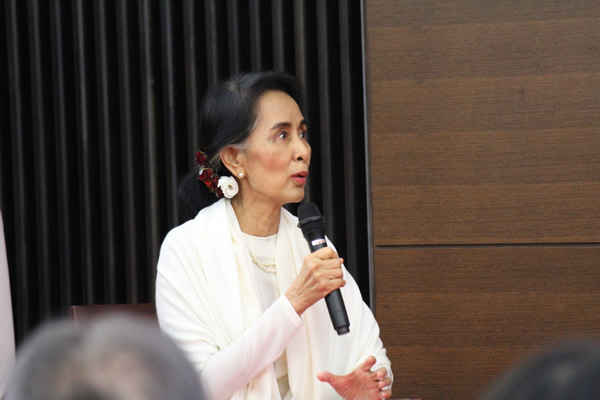
Fig.4 学生に答えるスーチーさん
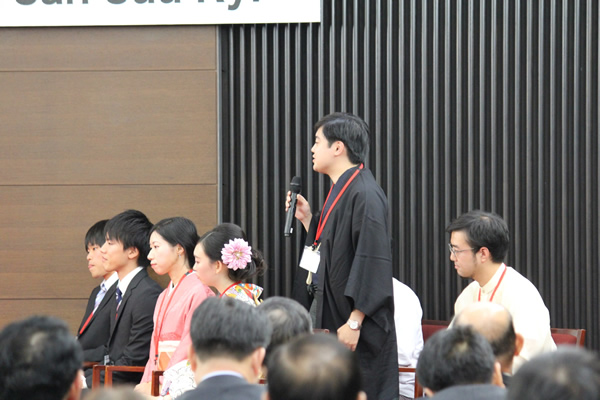
Fig.5 学生との記念撮影1
ASSK: Well, you talk about making the right decision now, not just making decisions, but making the right decision. I have often said that in politics, there isn’t just one right answer. There are several answers that may well be right, but you have to choose one. And I think it’s the same with when you’re making a difficult decision - it means that you’re not quite sure which is the right one. If you are perfectly sure, then there is no problem. If there is a very clear case of either this or that, then that’s no problem. You choose whatever is right. But sometimes, there are several alternatives. And then, I think, the problem starts. You begin to wonder which one to choose. But, the point is that you have to make a choice. You have to bear the responsibility for your choice. That is the first thing you have to recognize. Whatever decision you make, you must bear the responsibility. But once you’ve chosen it, and you are, I think, envisaging a situation where the right choice is not obvious, then once you’ve chosen one decision which you hope is right, then you’ve got to make it the right one. You’ve got to try your best to make it work. And, that’s how it is with politics. We’ve had to make difficult decisions. Let me give you a couple of very concrete examples. In 2010, the first general elections in 70 years -in 26 years I think- were held in 2010. And we had to make a decision as to whether or not we were going to contest the elections. And, in order to contest the elections under the new constitution, we had to re-register our party. And, in order to re-register our party, we would be obliged to expel all our members who were either in prison or who have been tried. Now, I was included among those. So, we had to make this very, very important decision. Do we contest the elections and expel all our most dedicated and committed members - because these were the ones who were in jail -or do we stay out of the elections and risk becoming an illegal organization? We decided that we would not contest that election. Now, that was a difficult decision because it could have destroyed our party. But we decided that if we were to expel our most committed members, if we were to turn our backs on them for the sake of our own safety as a party, our party would not be in a position to work for the people in the long run, because we would have lost credibility. But of course, it was a dangerous decision as well. We contested the law that required us to re-register in court, saying that when previously registered as a political party, this was not part of the rules. So, that was one of the decisions we took. And we lived with it for two years. Then, we were given an opportunity to take party in the by-elections. And then, again the government invited us to re-register as a party and take part in the by-elections. We thought about this, and we said, “if that regulation about expelling our members were changed, then we would re-register.” They did change it, so we decided to re-register. Then we were criticized by people who said, “why were we going in for the elections this time? Why had we decided to re-register?” But again, we decided that since this was the path we had chosen, we would make it work. We made it work by winning the by-elections. By working hard to win the by-elections. So, you can’t always be sure that you’re making the right decision. But once you’ve made the decision, just do everything possible to make it the right one. And as for the most difficult decision I’ve taken in my life, I can’t say there’s one particular one, but the ones I’ve mentioned have been difficult. The one I took in 2010, and then again in 2012. I’m sure there will be many more difficult ones.
My name is Aoi Seo and I am a student at Kyoto University Graduate School of Environmental Studies and my major is Civil Engineering. I do research on geotechnology. However, I would not like to ask you about soil or clay. I’m interested in what Myanmar will become, and how Myanmar will change. When I was told that I would be able to see you today, and ask you a question, I researched you online, and I got to know that you have lived in India, Britain, America and also visited many countries. So, I have a question about that. Among these countries, are there any countries that can be a model of the future of Myanmar regarding democracy, the economy, or environmental policy? Anything is okay. Could you please tell me your vision of the future of Myanmar?
ASSK: Well, my vision of the future of my country is an amalgam of all that is best in the countries you’ve mentioned. No country has everything that is best in the world. Some aspects of a society, some aspects of its government, some aspects of its economy are among the best, but not all. So, you have to choose. I’ve found that wherever I’ve lived, once I get to know the place and the people, I start getting very fond of them because I begin to understand them. So, in the end, what you need to do is understand the situation of your own country if you want the best possible for it. Our people are quite different from the Japanese. I keep telling my people, “You’re not as disciplined as the Japanese. You’ve got to learn. You’ve got to work harder. Because we have been fortunate to live in a country where live was very easy for many, many decades. But, it is not so now. And, now that life is getting more difficult, people are learning to work harder, which is a good thing. So, we want to learn from different countries, and we want to take the best from different countries, but one thing I do want to say is that we want to preserve the environmental beauty of our country. Because it would be very difficult to reverse a situation once it has been ruined. And, as an environmentalist, I’m sure you understand this. I would like to invite you to come to Burma and look at it and see what can be done to make sure we conserve its beauty in the best way possible, while making sure that our people are able to advance economically. Because let’s not be romantic: starving people cannot feed on beauty. They have to be able to have the necessary material ingredients that will make life comfortable and happy, as well as the aesthetic pleasure of their surroundings. Thank you so much.
My name is Ayaka Nomura, I am a graduate student at the graduate school of the Advanced Integrated Studies of Human Survivability (GSAIS). Through our school program, I stayed in Myanmar in August 2016. I visited your country’s villages, and they welcomed us very warmly, and they especially loved to feed us a lot. During our stay, we listened to a lecture on Myanmar’s education system and its challenges. Education disparity between cities and villages is one of the serious problems in Myanmar, I reckon. So, could you please share your thoughts on this topic? And also, what can Japan, especially us as Kyoto University do to support Myanmar in this regard? Thank you very much.
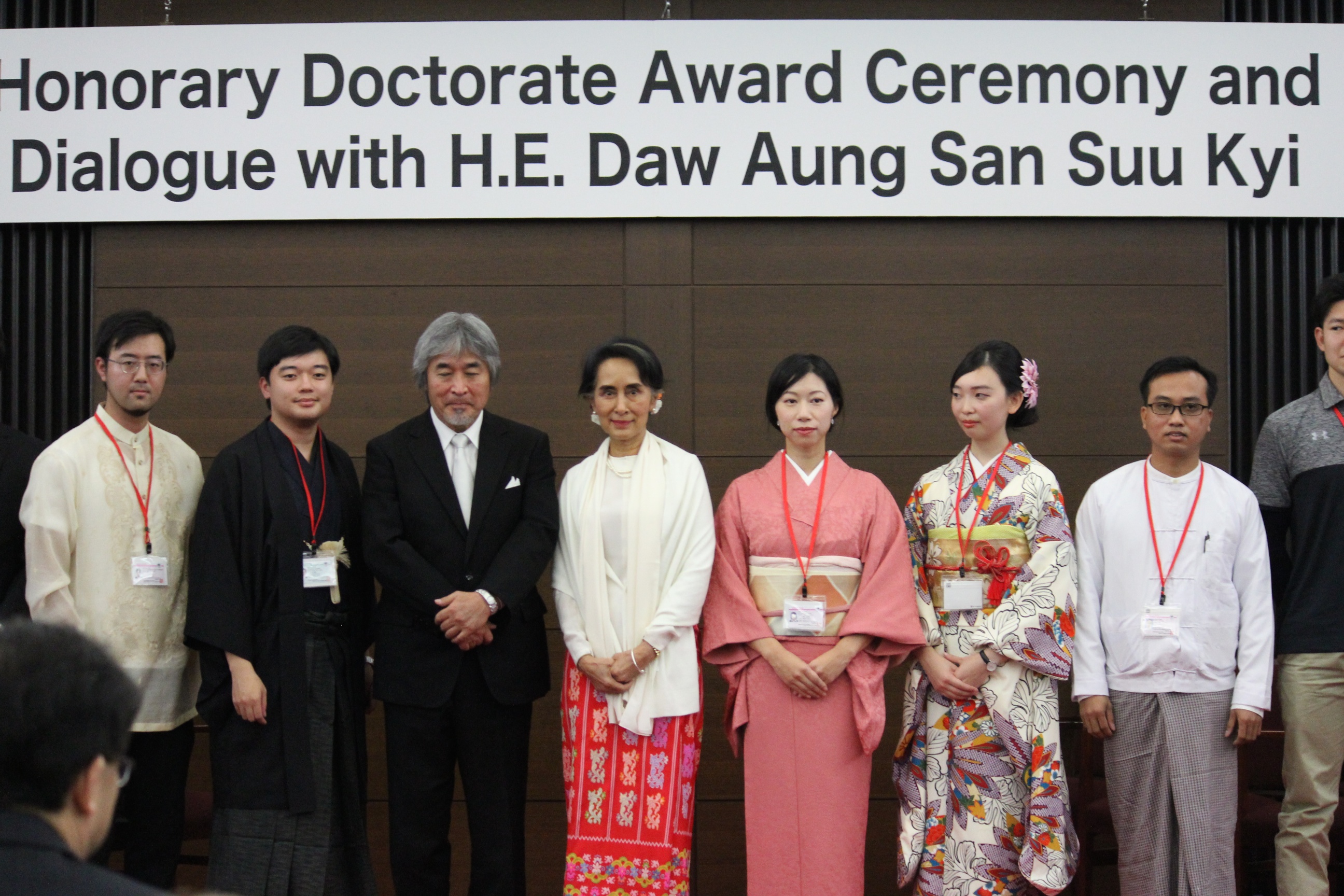
Fig.6 学生との記念撮影
ASSK: Well, education is a big issue in my country, because progress is based on a good education system. Once upon a time, that is to say, going back to the years when we first became an independent nation, our country was considered to have the best education system in the East, but of course, those day are long past and we cannot sit on our laurels, we have to rebuild our education system to make us fit to face the world in which we live. Now, you talked about the difference between the cities and the villages. That is very true of course. Traditionally, there was very little difference between cities and villages. Even now, in my country, you will not be able to tell from the way people speak what stratum of society they come from. That is the intrinsic equality that has existed between our people since historic times. But now, it’s beginning to change. The privileged go to better schools. That is particularly within the last decade or so when private schools were once again allowed in our country. And the gap between the well-educated elite, which is very, very small, and the people in our villages is getting broader and broader. I do not think that the standard of education between towns and villages on the whole is that far apart. But in some parts of the country, particularly in the border areas, their education system has a struggle, particularly in our ethnic areas where their mother tongue is not Burmese. And our education system is conducted in Burmese, which is the official language of our country. We’ve had a struggle with this because there are those who said that they should be allowed to teach in their mother tongue, but that brings many difficulties. We have, officially, 135 different ethnic groups, and it would be very difficult for us to have an education system where different pockets of people were allowed to teach in different languages. And, in any case, some of those languages cannot be written down. There is no written language in some ethnic groups. They’re just a spoken language, so we couldn’t possibly use it for education. So, this difference in language makes for a big gap in the achievement of the children in different areas, and we’ll have to try to remedy it in various ways. First of all, we are now making it part of our law that the mother tongue can be used as a classroom language so that we can have assistant teachers translating into the mother tongue, but the teaching will have to be done in the main language, which is Myanmar, or Burmese. Because otherwise, we will not be able to have an integrated education system. What our ethnic peoples want is a genuine federal system. To achieve such a system, we have to make sure that there is a right balance between integration and between diversity. We have to be integrated as a nation, but we have to have diversity as different ethnic groups in order to keep the spirit of federalism alive. So this is a challenge that seems into our education system. In which village were you staying? What is in the most inner Myanmar part, or was it in one of the ethnic…
We stayed in Yangon, and also Naypyidaw. The village was the nearest to Naypyidaw.
Well. I am not sure that is the sort of village I had in mind. And Naypyidaw, by the way, is not typical of our country, as I’m sure you’ve noticed. You can find only one Naypyidaw in Burma. But, the villages where you were, yes, they would be different from the cities, but I don’t think the gap between the villages and Naypyidaw, and some of the schools, I don’t say all, in Yangon, for example, would be that large.
Hello, very nice to meet you. My name is Bo Sann, coming from Myanmar. Now, I’m a PhD student in the Graduate School of Agriculture in Kyoto University. I’m really proud to be here in such an excellent university that you’ve joined as a visiting researcher in 1985, when I was born. In Myanmar, I’m working in the Forest Department, under the Ministry of Natural Resources and Environmental Conservation. My question is about current peace making processes. When our country Myanmar is on the border of democracy, and there is a long way to go. On our road to democracy, one important issue is national reconciliation, especially with ethnic groups. Since 60 years ago, the previous Myanmar government have had the struggle of creating unity within all ethnic groups, but unfortunately, that goal has not been achieved yet. We know that you are now trying to solve this very difficult problem through a series of meetings such as the Union Peace Conference, the 21st century Panglong. In this peace making process, you have to negotiate with the military leaders on the one hand, and ethnic group leaders on the other hand. I think this is very tough. So, my question is: what is the biggest challenge for you to negotiate as a leader between the national army and ethnic armed groups?
ASSK: It’s the same, really. It’s mutual understanding and confidence. The reason why people fight is because they don’t believe in each other. It’s because they think they have to preserve and defend themselves. They don’t believe that the other side – sides in our case, we have many ethnic armed groups involved in the peace process - will defend their rights. So, it’s a matter of mutual confidence. Building up confidence, building up understanding, building up the kind of approach where you think of the good of the country as a whole and not of your own organization of your own group. Now, this is difficult to achieve because we speak very blithely about unity out of diversity, but unity out of diversity is not something that can be implemented just because you want it to be implemented. If you want it to happen, you have to work towards it, and it’s a long process, it takes a lot of patience, it takes a lot of determination and motivation. We believe that this is possible. And because we believe that it is possible, we work at it with honesty. Honesty is very important in such a negotiation.
If you base your negotiations on deceit, then you will never succeed. You may for a short time, in the short run. You may be able to achieve some kind of understanding, but it will be broken if you have been dishonest about your motives and what you’re prepared to offer. But, I’ve often said to the different armed groups, that when they come to the peace conference, what they should be thinking about is what they have to contribute toward the peace process. Not about what they think they can get out of it. Now, of course it’s human nature to always want to try to get something out of a situation, but that is human nature, and I don’t think that we should think that this is a great crime. But, I think that if you live in society or if you live in a country which has to be built into a true union, then you have to give as well. You have to be prepared to give. It is something basic that we have to repeat again and again. That give and take means you give as well as take. It doesn’t mean that you take all and everybody else gives, which some people think it is. So, that is what I find most difficult. Making people understand that we have to work for the common good. And building up confidence and trust in each other.
I’m Shuzo Tani from the School of Government, studying Public Policy, and starting April 2017 I will be working in the Ministry of Foreign Affairs (MOFA) as a diplomat. My question today is not about diplomacy, unfortunately. In 2012, I had the great pleasure of meeting a lot of Myanmar youths on the Ship for Southeast Asian Youth Program. This is a program sponsored by the Japanese government, and it has been fostering Japan and Asian friendship for 40 years. In this program, which lasted nearly two months, I got to meet a lot of Myanmar students and youths, and I thought that they was a lot of untapped potential yet, especially in the younger generation of Myanmar. And, as everyone knows, you have plenty of overseas experience, and as a former researcher, and also as a foreign minister, I’d like to ask you what you think is the best way to promote Myanmar students to study abroad, and also for countries like Japan to better welcome student from overseas?
ASSK: The reason why we want to send our students to study abroad is because, as I’ve mentioned earlier, our education system has been very weak for the past half century. And, in order to bring up the standard of our education system, we have to depend on outside friends to help us as well. But, the real need is to build up the education system within our country. We should go out to the world in order to broaden our vision and to learn more about the world, and to learn more about the subjects which are a specialty in certain different places. Not just to make up for the weaknesses of our own education system. I have to say that - we earlier mentioned the elitism that has been coming into Burma - the privileged are taught very well, because they can send their children to the international school and the expensive private institutions, whereas the poor in the villages are taught very poorly. Now, it worries me that some of our children, the children of privileged families who go to these expensive schools, think it’s a matter of pride not to speak their own language, because they’re taught in English, and this is something that I find really truly, truly reprehensible. You should be proud of being able to speak your own language. I want our students and our young people to be proud of their own country. To be proud of their own culture. And only then will they be fit to go abroad and get the best of what the world has to offer. If they go out into the world thinking that their culture is not something to be proud of, if they go out into the world ashamed of their country and their people, they will not be able to bring back the best that the world has to offer. So, that is what I want our students to do. I want them to go out as young people who are proud of their country, who are committed to helping their country to make more progress, and who have gone out to learn what they can learn for the sake of the greater society back home, rather than just for themselves. It’s not any particular subject. Whether they go out to learn about diplomacy, or medicine, or civilization - that is a very difficult word to get one’s tongue around - whatever it is they abroad to study, we would like them to study with the intention of bringing it back home for those who have not had the privilege of the opportunity to broaden their horizons.
My name is Zenta Nishio, a PhD student here in Asian and African area studies. I have been researching about slum communities in Manila, the Philippines. After World War II, the people migrated from rural provinces to urban areas. Yet unfortunately, the Philippine government could not afford to provide legal housing for them. This is why, in Manila now, a tremendous slum community exists there. This housing issue has come to represent social and economic inequality. Myanmar is now experiencing high economic growth, around 7-8% GDP. And Yangon is experiencing radical urban expansion. Myanmar is transitioning to a democracy, but it is a country like the Philippines, where the rich people are getting richer and there exists the possibility to produce more poor people. The Philippines also produces a lot of poor people, even though they have democracy. So, this is very difficult question, but I would like to ask how to make a balance between democracy and the developing economy. How do you think, for the future of Myanmar and the future of the common people, can you make a balance between the economy and the democracy for countries?
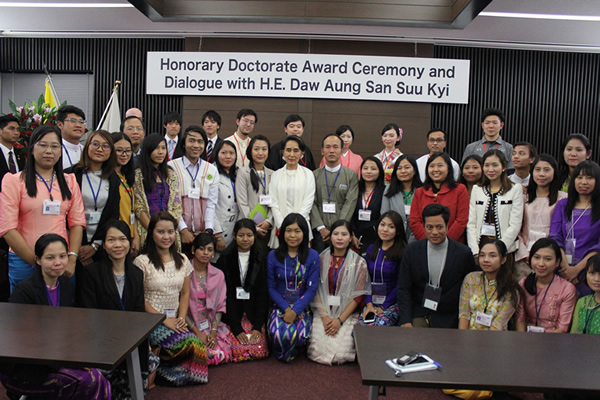
Fig.7 出席したミャンマー人留学生との記念撮影
ASSK: Thank you, particularly because you mentioned the problem of affordable housing, which we’re having to face in Yangon in particular. We have to make sure that those who do not have houses should be given homes, but at the same time, we do not want to promote the problem of squatters. So this is an issue that needs a very, very finely balanced solution. But you’re talking about the connection between democracy and development. You cannot have one without the other. Not in the long run. Democracy will not be sustainable if the people cannot see that democracy means better development for them. Because in the end, it’s quite natural that people should opt for a system that offers them the best kind of life possible. I remember listening to a radio program on the BBC a long time ago, this is while I was still under house arrest, so that must have been about 10-15 years ago, I’m not quite sure about the exact date. There was going to be a general election in India. India, as you know, has the largest democracy in the world, and it also has a very high percentage of illiteracy. In one of the programs, the interviewer had gone down to a village and was asking an ordinary village woman who was not able to read or write, or had never been to school. The interviewer was asking her for which party she was going to vote. And she told the interviewer, “I’m going to vote for this particular party,” and she was asked, “For which party did you vote in the previous election?” and she said “I voted for another party in the previous election, and the one before that. But now, in this election, I’m going to vote for another one,” and the interviewer asked why. And she said, “Well, before the last two elections, that party promised that they would give us running water. They still haven’t given us running water. I’m not going to give them a third chance.” Now, I like the answer of that woman, because maybe she was uneducated in the sense that she had never been to school, but she was very practical. First of all, she didn’t like people who did not keep their promises. Neither do I. So I sympathize with her entirely. And secondly, she didn’t think there was any point in voting for a member of parliament who had failed to deliver. And she said “what is the point in my voting for a party which still has not been able to give us running water after about…” I think it was ten years since the first promise was made. So that is very normal and that is acceptable, that is right. You must make sure that a particular political system that you are trying to root into society will also bring about a better life for the people of society. We are not working for democracy because it’s some kind of ideal theory. It’s because we think that is the system that would best enable our country to progress because it gives the greatest opportunity to the greatest number to be involved in the development process of our country. That is why we want democracy. I think it was Winston Churchill who said that democracy is not such a good system, but the others are even worse. So, we have to make do with the best that our human intellect has been able to devise so far, and we believe that it will work, but it will work only if we make sure that it gives our people a chance to live better lives. And I hope that in Japan, you’ll be helping us with this as well. Thank you very much.
